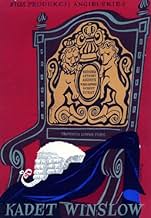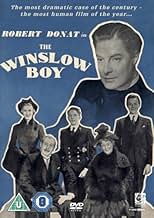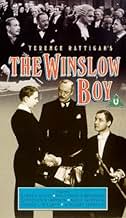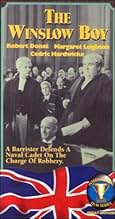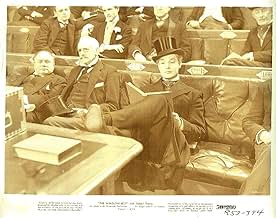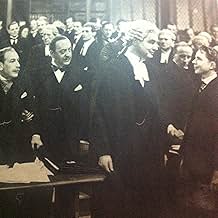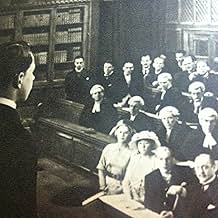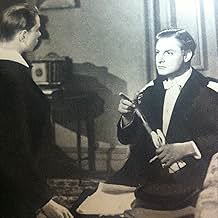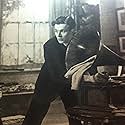IMDb-BEWERTUNG
7,6/10
1999
IHRE BEWERTUNG
Füge eine Handlung in deiner Sprache hinzuIn pre-WWI England, a youngster is expelled from a naval academy over a petty theft, and his parents raise a political furor by demanding a trial.In pre-WWI England, a youngster is expelled from a naval academy over a petty theft, and his parents raise a political furor by demanding a trial.In pre-WWI England, a youngster is expelled from a naval academy over a petty theft, and his parents raise a political furor by demanding a trial.
- Nominiert für 1 BAFTA Award
- 1 Gewinn & 2 Nominierungen insgesamt
Cedric Hardwicke
- Arthur Winslow
- (as Sir Cedric Hardwicke)
Empfohlene Bewertungen
This is one of the greatest movies I have ever seen, and since I turn 92 next month, I have seen a fair number of movies. Robert Donat, one of England's greatest actors ever, embodies the true-life soul of Sir Robert Morton, a high-powered attorney, who sacrificed his success for principle. Sir Cedric Hardwicke as magnificent as the accused boy's beleaguered father. Margaret Leighton's chemistry with Donat is flawless. The dialogue by Terrence Rattigan is equally classic. There are also wonderful small bits by Stanley Holloway, Cyril Ritchard, and Ernest Thesinger. If you wish to see a classic English film, almost unknown in this country, rent this one, and you are in for a treat.
Incidentally, there is also a 1998 version of this movie starring Jeremy Northam and Ian McKellen. Although it does not approach the greatness of the original, it is a more than satisfactory homage, and well worth seeing in its own right --- AFTER you've treated yourself to Donat's classic performance.
Incidentally, there is also a 1998 version of this movie starring Jeremy Northam and Ian McKellen. Although it does not approach the greatness of the original, it is a more than satisfactory homage, and well worth seeing in its own right --- AFTER you've treated yourself to Donat's classic performance.
This is my second favorite movie of all time, after A Man For All Seasons. Both are spectacular to me because they embrace, discuss, and analyze philosophies and ideals. Both are also spectacular because of once-in-a-lifetime leading man performances. Scofield, quite justly, won Best Actor of 1966. I think he his portrayal was the Best of the 20th Century -- but I digress.
Donat is equally eloquent, compelling, and vulnerable as Sir Robert Morton. Donat is, in my opinion, one of the best 10 actors ever, and has a screen presence, and an embedded sense of irony, few have ever equalled. Sir Cedric Hardwicke and Margaret Leighton are absolutely superb in their roles as well. And there is a marvelous dance hall cameo from Cyril Ritchard and Stanley Holloway.
The brittle exterior of Sir Robert belies a passionate and sensitive lover of the law. Many times actors have essayed crusty characters trying to hide their hearts of gold, this portrayal goes so infinitely beyond that it makes all others look like pale imitators.
This is a movie that demands to be seen. The recent remake with Northam and Pidgeon was surprisingly good, but this one is pure greatness.
Donat is equally eloquent, compelling, and vulnerable as Sir Robert Morton. Donat is, in my opinion, one of the best 10 actors ever, and has a screen presence, and an embedded sense of irony, few have ever equalled. Sir Cedric Hardwicke and Margaret Leighton are absolutely superb in their roles as well. And there is a marvelous dance hall cameo from Cyril Ritchard and Stanley Holloway.
The brittle exterior of Sir Robert belies a passionate and sensitive lover of the law. Many times actors have essayed crusty characters trying to hide their hearts of gold, this portrayal goes so infinitely beyond that it makes all others look like pale imitators.
This is a movie that demands to be seen. The recent remake with Northam and Pidgeon was surprisingly good, but this one is pure greatness.
"The Winslow Boy" has an interesting pedigree. The story is based on a real case involving a young cadet who was dismissed from his school without any sort of trial or due process. It seems in the early part of the twentieth century in Britain, there was a petty theft and the boy was punished even though it was not clear he'd committed the crime. Not surprisingly, the boy's father insisted there was a miscarriage of justice...but what makes it interesting is that the case didn't drop there but made its way all the way up to sessions of Parliament....where the case was championed by an MP. Some time later, the playwright and screenwriter, Terrence Rattigan, resurrected the story and wrote a play about it...and changed the names in the process. Now, some time after the play, the story finally made its way to film and Rattigan teamed up with one of his favorite directors for this well made movie.
It certainly helps the story that two very distinguished English actors appeared in two of the leading roles, Robert Donat and Sir Cedric Hardwicke. Oddly, Donat was given top billing...even though he doesn't appear in the film until about the 40 minute mark! But both are mesmerizingly good...and the well crafted story really makes an impact on the viewer, as they, too, are outraged by the school's high-handed and unfair handling of the case...especially when the accused was a mere boy. Well worth your time.
It certainly helps the story that two very distinguished English actors appeared in two of the leading roles, Robert Donat and Sir Cedric Hardwicke. Oddly, Donat was given top billing...even though he doesn't appear in the film until about the 40 minute mark! But both are mesmerizingly good...and the well crafted story really makes an impact on the viewer, as they, too, are outraged by the school's high-handed and unfair handling of the case...especially when the accused was a mere boy. Well worth your time.
Terence Rattigan, once the toast of London's West End, fell very much out of favor when a new generation of playwrights made his plays seem antiquated and irrelevant. It took David Mamet's excellent filming of the "Winslow Boy" to remind us, that at his best, Rattigan was an exceptionally fine dramatist. Having much enjoyed the movie, I was curious to see the 1948 version directed by Anthony Asquith, who worked on a number of occasions with Rattigan.
It's an exceptional film from all accounts. Asquith's adaptations of theater works for the screen are excellent. Without opening them out too extensively they manage to avoid being stage bound, (Pygmalion, Browning Version, Importance of Being Earnest).
Being already familiar with the storyline, I simply sat back and savored the wonderful performances, and what performances they are. Cedric Hardwicke as the father lacks the softness of Nigel Hawthorne's portrayal and yet that's what precisely makes it ultimately more moving. Robert Donat overflows with charisma and Margaret Leighton plays her very first screen appearance with much intelligence and total aplomb.
The best of British
It's an exceptional film from all accounts. Asquith's adaptations of theater works for the screen are excellent. Without opening them out too extensively they manage to avoid being stage bound, (Pygmalion, Browning Version, Importance of Being Earnest).
Being already familiar with the storyline, I simply sat back and savored the wonderful performances, and what performances they are. Cedric Hardwicke as the father lacks the softness of Nigel Hawthorne's portrayal and yet that's what precisely makes it ultimately more moving. Robert Donat overflows with charisma and Margaret Leighton plays her very first screen appearance with much intelligence and total aplomb.
The best of British
This film kept me in suspense not knowing what the outcome would be. The acting, period atmosphere and historical recreation are all outstanding. The Winslow Boy is directed by Anthony Asquith and has a stellar cast led by Cedric Hardwicke, Robert Donat, Margaret Leighton and others. The film evokes a period of time when honour, self-sacrifice and the heavy arm of authority ruled countries such as England in the name of the common good.
The setting is the Edwardian Era of early 20th century England and into this time and place, we find a youth who has been expelled from a naval academy for stealing. The family believes he is innocent and his recently-retired father, distant from his children, ageing and afflicted with arthritis, sees an opportunity to strike a blow for his youngest child against injustice. In jurisprudence, it is called let right be done.
In this heroic effort, Arthur Winslow the father, played by Cedric Hardwicke, is backed by the strong conviction of his daughter Kate (Margaret Leighton) and Sir Robert Morton who takes on the government of the day (Robert Donat).
Thirteen-year old Ronnie Winslow is expelled from his academy for theft. The evidence against him is real but the son is adamant that he is innocent. Arthur Winslow believes his son and takes the matter to his lawyer and eventually to the Cabinet. He is paid a visit by Robert Donat, as Sir Robert Morton, a Member of Parliament, who takes up the case.
One of the most hard-hitting scenes is a ruthless cross-examination. The boy maintains his innocence and the MP leaves their home convinced of the boy's innocence. The badgering is relentless and had me on the edge of my seat as Donat hurls one accusation after another at the boy, who does not bend during the ordeal.
Sir Robert takes a shine to Kate, Arthur Winslow's daughter, who is played by Margaret Leighton. She superbly performs the role and risks her engagement by pressing the MP to proceed with the case, which has now become a national sensation.
There is a dramatic showdown in the House of Commons and the First Lord of the Admiralty, egged on by Sir Robert, agrees to let the case go to court. The final outcome has added emotion as the senior Winslow, and Sir Robert are tired and ailing.
This is an excellent period piece as well as high drama with great acting by the leading players and those in supporting roles, particularly Kathleen Harrison, the housekeeper. The era is evoked with scenes taking place on golf courses and men's clubs where politicians discuss matters of state, not to mention the churches, concert halls and railway stations. The nation's affairs are dominated by the suffragettes and the Irish question. All-round great entertainment. Highly recommend.
The setting is the Edwardian Era of early 20th century England and into this time and place, we find a youth who has been expelled from a naval academy for stealing. The family believes he is innocent and his recently-retired father, distant from his children, ageing and afflicted with arthritis, sees an opportunity to strike a blow for his youngest child against injustice. In jurisprudence, it is called let right be done.
In this heroic effort, Arthur Winslow the father, played by Cedric Hardwicke, is backed by the strong conviction of his daughter Kate (Margaret Leighton) and Sir Robert Morton who takes on the government of the day (Robert Donat).
Thirteen-year old Ronnie Winslow is expelled from his academy for theft. The evidence against him is real but the son is adamant that he is innocent. Arthur Winslow believes his son and takes the matter to his lawyer and eventually to the Cabinet. He is paid a visit by Robert Donat, as Sir Robert Morton, a Member of Parliament, who takes up the case.
One of the most hard-hitting scenes is a ruthless cross-examination. The boy maintains his innocence and the MP leaves their home convinced of the boy's innocence. The badgering is relentless and had me on the edge of my seat as Donat hurls one accusation after another at the boy, who does not bend during the ordeal.
Sir Robert takes a shine to Kate, Arthur Winslow's daughter, who is played by Margaret Leighton. She superbly performs the role and risks her engagement by pressing the MP to proceed with the case, which has now become a national sensation.
There is a dramatic showdown in the House of Commons and the First Lord of the Admiralty, egged on by Sir Robert, agrees to let the case go to court. The final outcome has added emotion as the senior Winslow, and Sir Robert are tired and ailing.
This is an excellent period piece as well as high drama with great acting by the leading players and those in supporting roles, particularly Kathleen Harrison, the housekeeper. The era is evoked with scenes taking place on golf courses and men's clubs where politicians discuss matters of state, not to mention the churches, concert halls and railway stations. The nation's affairs are dominated by the suffragettes and the Irish question. All-round great entertainment. Highly recommend.
Wusstest du schon
- WissenswertesThis film is based on the real-life Royal Navy cadet George Archer-Shee (1895-1914), the alleged theft took place in 1908 and the trial in 1910. Archer-Shee was commissioned in the British Army in 1913 and was killed in WWI at the First Battle of Ypres on October 31, 1914.
- PatzerWhen the film opens, a suburban train is coming into a station. The locomotive is in the livery of LNER (London & North Eastern Railway). Arthur Winslow alights having told his travelling companions that he has just retired from Lloyds Bank. When he gets home he shows his wife a pocket watch the bank gave him to mark his retirement. It's dated 1912, but the LNER wasn't created until 1923.
- Zitate
Sir Robert Morton: I wept today because right had been done.
Catherine Winslow: Not justice?
Sir Robert Morton: No, not justice, right. It's easy to do justice, very hard to do right.
- VerbindungenVersion of The Winslow Boy (1958)
Top-Auswahl
Melde dich zum Bewerten an und greife auf die Watchlist für personalisierte Empfehlungen zu.
- How long is The Winslow Boy?Powered by Alexa
Details
- Erscheinungsdatum
- Herkunftsland
- Sprache
- Auch bekannt als
- The Winslow Boy
- Drehorte
- London Film Studios, Shepperton, Surrey, England, Vereinigtes Königreich(studio: produced at London Film Studios Shepperton, England)
- Produktionsfirmen
- Weitere beteiligte Unternehmen bei IMDbPro anzeigen
- Laufzeit1 Stunde 45 Minuten
- Farbe
- Seitenverhältnis
- 1.37 : 1
Zu dieser Seite beitragen
Bearbeitung vorschlagen oder fehlenden Inhalt hinzufügen

Oberste Lücke
By what name was Der Fall Winslow (1948) officially released in Canada in English?
Antwort
